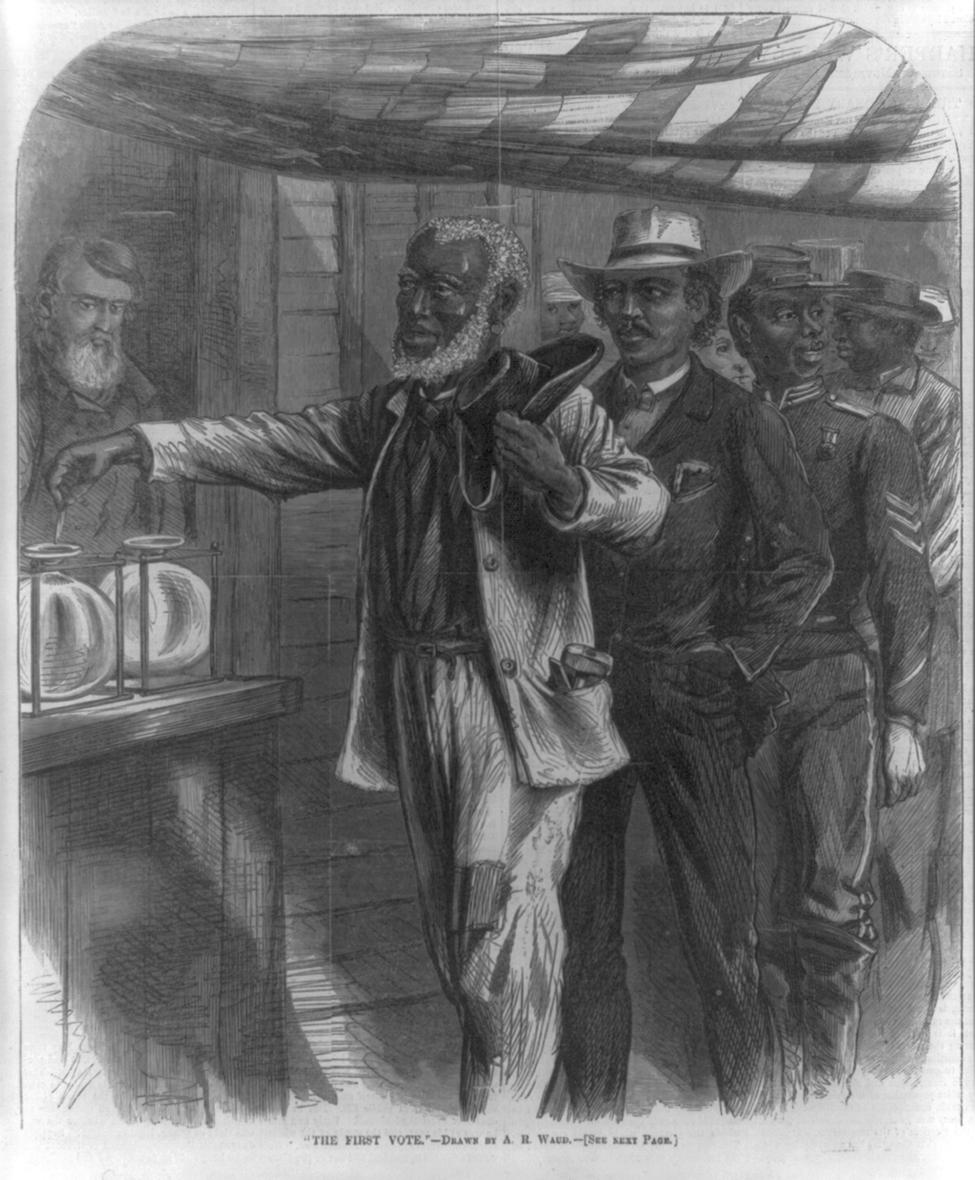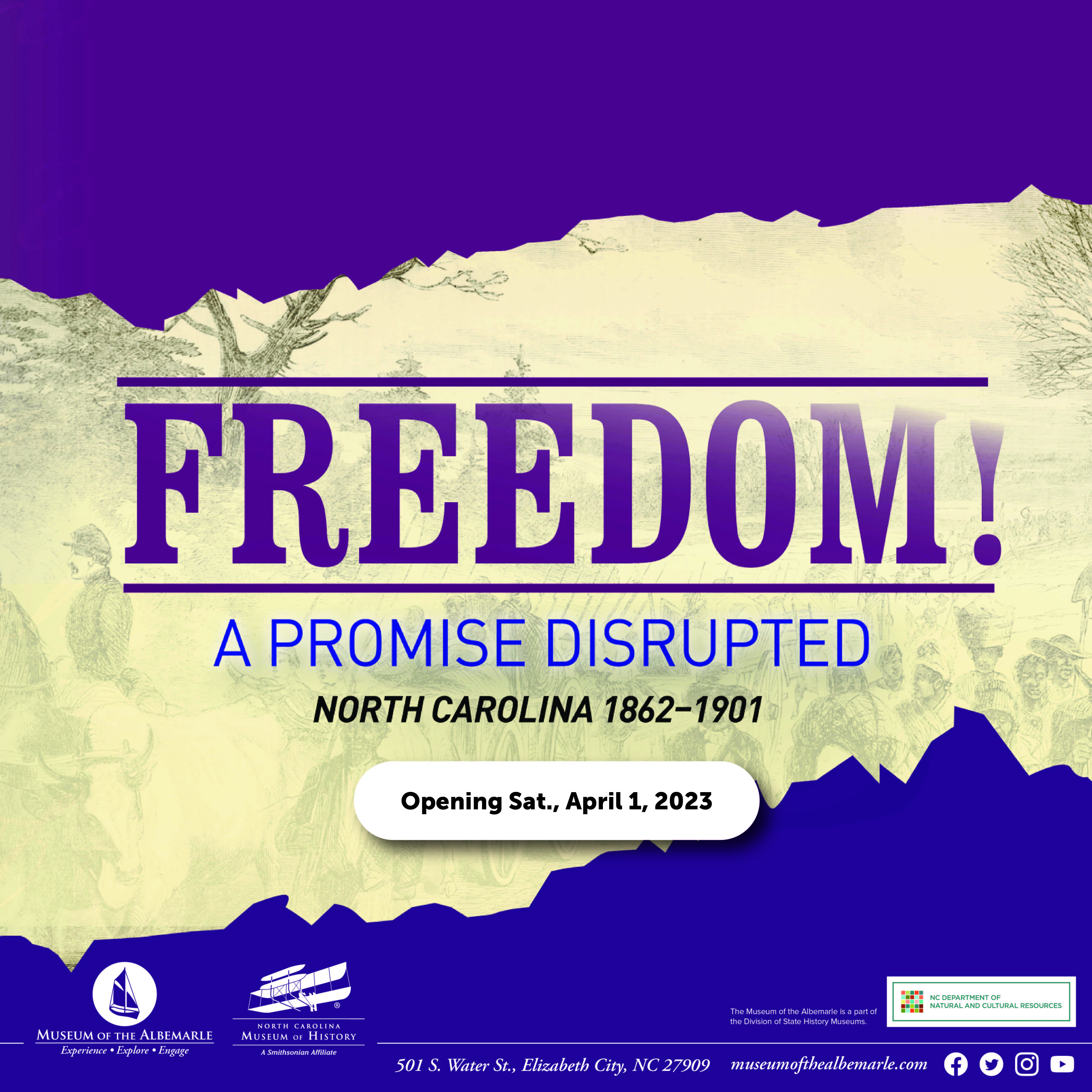
6 minute read
“Redeemed Check” Marked Insufficient Funds!
By Earl L. Ijames, Curator, North Carolina Museum of History, Raleigh
In August 1963, Dr. Martin Luther King Jr. delivered the “I Have a Dream” speech on the steps of the Washington Monument to a crowd of nearly a quarter million spectators on the National Mall. There, King declared a full century after President Abraham Lincoln’s 1863 Emancipation Proclamation that “America has defaulted on this promissory note insofar as her citizens of color are concerned. Instead of honoring this sacred obligation, America has given the Negro people a bad check, a check which has come back marked ʻinsufficient funds.ʼ”
Freedmen voting in November 1867

Note the United States Colored Troop veteran third in line.
Courtesy Harper’s Weekly
After the Civil War (1861–1865), the 13th Amendment to the US Constitution outlawed slavery in the United States and its territories. North Carolina ratified the 13th Amendment on December 4, 1865. Two days later, neighboring Georgia ratified the amendment, resulting in three-quarters of the states approving it, thus freeing all Americans from the scourge of slavery.
In January 1868, Congress adopted the 14th Amendment, guaranteeing citizenship to native-born Americans , making the 400,000 African Americans in North Carolina and 4.5 million freedmen throughout the south American citizens. This was a radical move because enslaved African Americans had counted as threefifths of a person toward the population count. The laws and customs in American society generally treated people of color with “no rights that a White man was bound to respect” (North Carolina Supreme Court, 1828)
In February 1870, Congress adopted the 15th Amendment, the last of the three Reconstruction Amendments. The 15th Amendment granting the right to vote to African Americans was probably the most contentious of these amendments. People of color comprised majority populations in large swaths, spanning from southeastern Virginia into eastern North Carolina through the entirety of South Carolina, westward to the Mississippi delta. In the heart of this “Black Belt” lies the state of Alabama.
This amendment frightened and angered many who opposed legal equality. In the midst of adopting the Reconstruction Amendments, terrorist groups like the Ku Klux Klan (KKK) emerged and intimidated countless voters (see quote).
Lyrics from the song Ku Klux Klan by Steel Pulse, 1983
By the 1890s, the KKK had expanded to include a paramilitary group called the Red Shirts. This group not only opposed African American voting but violently discouraged “Progressive” Whites and Blacks from voting for their economic and social interests. The short-lived biracial voting coalition called the Populist Movement was crushed in 1898 in Wilmington by the only coup d’état in American history. The duly elected bi-racial government of North Carolina’s largest city resigned at gunpoint while the Red Shirts marauded through the Port City, murdering innocent citizens with Gatling guns.
By 1901 North Carolina and other southern states adopted segregation and discrimination as public policy—- effectively nullifying the Reconstruction Amendments. By the 1960s, Montgomery, Alabama, had become ground zero for the struggle for equality. Beginning with the 1955 Montgomery Bus Boycott, King had become the spokesman for tens of millions of African Americans “tired of waiting.” In what would become one of the nation’s seminal moments, Dr. King points out in his 1965 “Selma to Montgomery ” speech (see quote).
Quote from Dr. Martin Luther King Jr.’s 1965 speech, "Selma to Montgomery"
The segregated Elizabeth City, NC Hook and Ladder Company, ca. 1900

The segregated Elizabeth City Hook and Ladder Company was formed in 1891 to fight fires and rescue and demolish compromised buildings with their famous “hook.” The 1890s represented the apex of African American accomplishments after the Civil War. Elizabeth City did not integrate its fire and rescue services until 1977.
Courtesy State Archives of North Carolina
In April 1960, King, was invited to Raleigh, by Shaw University to form a non-violent organization that would be led by youth, mainly students. Shaw alumna Ella Baker and Troy State University student John Lewis organized the Student Non-Violence Coordinating Committee (SNCC) at Shaw that month. SNCC would become the front-line soldiers for American liberty.
In February 1965, Jimmy Lee Jackson, a citizen of color in Dallas County, Alabama, was killed by state police while daring to register to vote. Jackson’s murder was the last straw in a century-long tyranny of African American voter suppression. The following month, locals were joined by other students, like Lewis, to plan a march 54 miles from Selma to Montgomery demanding voting rights. The marchers were met by state troopers and brutalized in what became known as “Bloody Sunday.”
King and the Southern Christian Leadership Conference (SCLC) joined the protest for the ballot. With the eyes of the nation on them and with the support of President Lyndon B. Johnson and the Alabama National Guard, a third march successfully reached the Alabama capital. At the conclusion of the last march, Dr. King declared, “The Civil Rights Act of 1964 gave Negroes some part of their rightful dignity, but without the vote, it was dignity without strength.”
We can only wonder how much better North Carolina and the American civilization would be if Reconstruction, or the full and fair integration of everyone into society, had succeeded. Instead of American Pie, everyone has been eating Jim Crow and its leftovers.
To learn more, please visit our exhibition, Freedom! A Promise Disrupted: North Carolina, 1862–1901.

This traveling exhibit, on loan from the North Carolina Museum of History, depicts the struggle that newly freed African Americans faced to maintain their freedom in the post–Civil War and Reconstruction eras of North Carolina.









